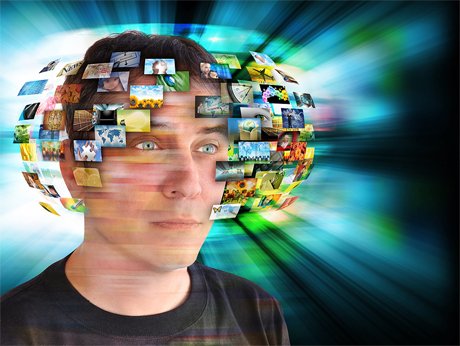
Recently, I met some family members I hadn’t seen in awhile for dinner at a busy restaraunt. On the drive to meet them, I was estatic. My heart and mind were open. I couldn’t wait to bond on the deep level I so desperately crave to bond on with the people I love. However, once I arrived at the restaraunt and settled in at our table, everything changed.
It was as if the minute I sat down at the table, a large chunk of myself -the one that thrives on depth- simultaneously stood up and not walked, but ran, out of the place. Suddenly the words I both spoke and thought barely penetrated the surface of the matters we talked about -which, in themselves, were very surface and really irrelevant if not counterproductive to our happiness. It didn’t take me long to figure out why. One glance at the room around me confirmed it -overstimulation.
Music was blaring while multiple TVs were on for no reason other than extra stimulation, as they were all muted. And at least one person at virtually every table had their head in their phone. My instinct was to run out of the place, fast. It was impossible to channel my true feelings and thoughts with so much needless commotion around me, leading me to the realization that reducing overstimulation in my life needed to be a priority.
Due to the overwhelming amount of external stimuli we so needlessly expose ourselves to (how many times have you left the TV on in your own home just for “background noise?”), we lack space, the space to dig deeper than the surface of who we are and of life in general. Often it is because admittedly or not, overstimulation has conditioned us to feel extremely uncomfortable in quiet, intimate settings with others and/or ourselves. Such situations demand deep introspect. They demand we bring deeper, authentic parts of ourselves to the table. Since so many of us have rarely done so due to being absorbed in external surface matters and overstimulation, we have no clue what those authentic parts are like; and as we know all too well, fear of the unknown is perhaps the greatest fear of all. Regardless of how you look at the situation, though, the end result remains the same: the consequences of failing to step outside of our overstimulated society results in a life that is, in many ways, less lived.
Ways Living In An Overstimulated Society Effects Us
- Making Memories: When constantly overwhelmed with artificial stimulation, we make little room
 to absorb the reality of the present moment. For example, we go out with friends and often place too much focus on taking pictures for social media and updating our statuses about what we are doing rather than actually enjoying the moment. As a result, we rob ourselves of the chance to make vivid, concrete memories. Being physically present in a moment does not equate with being there mentally.
to absorb the reality of the present moment. For example, we go out with friends and often place too much focus on taking pictures for social media and updating our statuses about what we are doing rather than actually enjoying the moment. As a result, we rob ourselves of the chance to make vivid, concrete memories. Being physically present in a moment does not equate with being there mentally. - Self-image: When we fail to take adequate quiet time to ourselves or to spend time in the present moment with others, social media, movies, magazines etc. send subliminal messages that we are not “enough” and need to look or do better in life, that we need to become something we are not. For many, not feeling like they are already “enough” is a constant struggle, leading to depression and anxiety. Spending quality time with ourselves and exploring who we really are, and what our deepest wants and desires are, inevitably leads to one conclusion eventually -the person we already are is more than enough.
- Relationships: How overstimulation negatively impacts relationships is pretty obvious -we become more focused on other people and things than the person we are with. We worry more about what others think of us, or what we think of the latest trending topic on Facebook, Twitter, or Instagram than we do about what our partner, friend, or family member is thinking or feeling. This makes it quite difficult to forge deep, long lasting, meaningful bonds.
Of course, I am not saying all external, artificial stimulation is bad. Clearly, there is much good in it (like this very site, which allows us to connect with like-minded people). The key is how we choose to use it. Social media can be great, given we use it to help ourselves and others and to shed light on enlightening, mind expanding topics rather than focusing purely on all of the bad things that are happening in the world. Television can also be great, given we choose to watch things that lift us up rather than those that bring us down and cause us to focus more on negative issues than positive ones. Cell phones are also great, clearly, for pretty self-explanatory reasons like being able to reach one another regardless, for the most part, of where we are. Finding a balance between artificial stimuli and the creative, authentic inner stimuli that surfaces when we quiet our surroundings and make room for it to do so is undoubtedly more challenging than it sounds in the society we live in, but it is also more than worth the effort.
Disclaimer: We at Prepare for Change (PFC) bring you information that is not offered by the mainstream news, and therefore may seem controversial. The opinions, views, statements, and/or information we present are not necessarily promoted, endorsed, espoused, or agreed to by Prepare for Change, its leadership Council, members, those who work with PFC, or those who read its content. However, they are hopefully provocative. Please use discernment! Use logical thinking, your own intuition and your own connection with Source, Spirit and Natural Laws to help you determine what is true and what is not. By sharing information and seeding dialogue, it is our goal to raise consciousness and awareness of higher truths to free us from enslavement of the matrix in this material realm.
 EN
EN

 to absorb the reality of the present moment. For example, we go out with friends and often place too much focus on taking pictures for social media and updating our statuses about what we are doing rather than actually enjoying the moment. As a result, we rob ourselves of the chance to make vivid, concrete memories. Being physically present in a moment does not equate with being there mentally.
to absorb the reality of the present moment. For example, we go out with friends and often place too much focus on taking pictures for social media and updating our statuses about what we are doing rather than actually enjoying the moment. As a result, we rob ourselves of the chance to make vivid, concrete memories. Being physically present in a moment does not equate with being there mentally.























